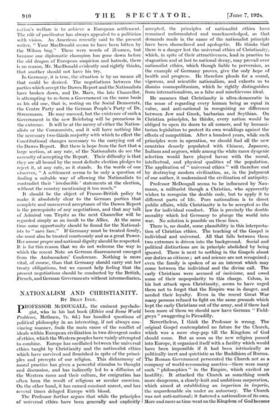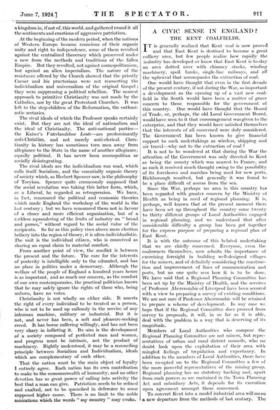NATIONALISM AND CHRISTIANITY.
BY DEAN INGE.
PROFESSOR McDOUGALL, the eminent psycholo- gist, who in his last book (Ethics and Some World Problems, Methuen, 7s. 6d.) has handled questions of political philosophy in an interesting, if not always con- vincing manner, finds the main cause of the conflict of ideals within European civilization in two divergent codes of ethics, which the Western peoples have vainly attempted to combine. Europe has oscillated between the universal ethics taught by Christianity and the nationalist ethics which have survived and flourished in spite of the princi- ples and precepts of our religion. This disharmony of moral practice has given a powerful stimulus to thought and discussion, and has indirectly led to a diffusion of the Western races and their culture, for emigration has often been the result of religious or secular coercion. On the other hand, it has caused constant unrest, and has several times deluged Europe with blood.
The Professor further argues that while the principles of universal ethics have been -generally and -explicitly- accepted, the principles of nationalist ethics have remained unformulated - and unacknowledged, so that demands made in the name of the nationalist principle have been shamefaced and apologetic. He thinks that there is a danger lest the universal ethics of Christianity, which, in spite of their attractiveness, lead in practice to stagnation and at last to national decay, may prevail over nationalist ethics, which though liable to perversion, as the example of Germany proves, give the only hope of health and progress. He therefore pleads for a sound, vigorous, and scientific nationalism, and exhorts us to dismiss cosmopolitanism, which he rightly distinguishes from internationalism, as a false and mischievous ideal.
He assumes that Christianity is ultra-democratic in the sense of regarding every human being as equal in value, and anti-national in recognizing no difference between Jew and Greek, barbarian and Scythian. On Christian principles, he thinks, every nation would be obliged to open its doors to all corners, and by humani- tarian legislation to protect its own weaklings against the effects of competition. After a hundred years, while such principles were in operation, we should find all the new countries densely populated with Chinese, Japanese, Indians and negroes, while among the white races dysgenic selection would have played havoc with the moral, intellectual, and physical qualities of the population. The application of " universal ethics " will therefore end by destroying modern civilization, as, in the judgment of our author, it undermined the civilization of antiquity.
Professor McDougall seems to be influenced by Nau- mann, a militarist though a Christian, who apparently wishes to recognize the double code, but to apply it to different parts of life. Pure nationalism is to direct public affairs, while Christianity is to be accepted as the law for individual conduct. This is precisely the double morality which led Germany to plunge the world into war. No solution is possible on these lines.
There is, no doubt, some plausibility in this interpreta- tion of Christian ethics. The teaching of the Gospel is individual and universal. All that falls between these two extremes is driven into the background. Social and political distinctions are in principle abolished by being. ignored. There is next to nothing in the Gospels about our duties as citizens ; art and science are not recognized ; even the family is spoken of as an interest which may come between the individual and the divine call. The. early Christians were accused of inciuisme, and owed some of their unpopularity to this charge. Celsus, in his lost attack upon Christianity, seems to have urged them not to forget that the Empire was in danger, and needed their loyalty. Even in the recent Great War many persons refused to fight on the same grounds which kept the early Christians out of the army, and if there had been more of them we should now have German " Field greys " swaggering in Piccadilly.
Nevertheless, I think the Professor is wrong. The original Gospel contemplated no future for the Church, which was a mere stop-gap till the Kingdom of God should come. But as soon as the new religion passed into Europe, it organized itself with a facility which would have been impossible if it had been intrinsically as politically inert and quietistic as the Buddhism of Burma. The Roman Government persecuted the Church not as a company of world-renouncing ascetics—there were many such " philosophies " in the Empire, which excited no hostility. It attacked the Church as something much more dangerous, a closely-knit and ambitious corporation, which aimed at establishing an imperium in imperio, the unpardonable sin under an autocracy. The Church was not anti-national; it fostered a nationalism of its own. More and more as time went on the Kingdom of God became a kingdom in, if not of, this world, and gathered round it all the sentiments and emotions of aggressive patriotism.
At the beginning of the modern period, when the nations of Western Europe became conscious of their organic unity and right to independence, some of them revolted against the centralized theocracy which preserved under a new form the methods and traditions of the fallen Empire. But they revolted, not against cosmopolitanism, but against an alien imperialism. The nature of the resistance offered by the Church showed that the priestly - Caesar and his praetorians were not reasserting the individualism and universalism of the original Gospel ; they were suppressing a political rebellion. The nearest approach to primitive Christianity was not made by the Catholics, nor by the great Protestant Churches. It was left to the step-children of the Reformation, the enthusi- astic sectaries.
The rival ideals of which the Professor speaks certainly exist. But they are not the ideal of nationalism and the ideal of Christianity. The anti-national parties— the Kaiser's Vaterlandslose Leute—are predominantly anti-Christian, and not merely anti-clerical. Chris- tianity in history has sometimes torn men away from allegiance to the State in the name of another allegiance, equally political. It has never been cosmopolitan or socially disintegrating.
The rival ideals are the individualism run mad, which calls. itself Socialism, and the essentially organic theory of society which, as Herbert Spencer saw, is the philosophy of Toryism. - Spencer quite erroneously supposed that the social revolution was taking this latter form, which, as a Liberal, he regarded as retrogression. We have, in fact, renounced the political and economic theories which made England the workshop of the world in the last century ; but we have renounced them not in favour of a closer and more efficient organization, but of a reckless squandering of the fruits of industry on " bread and games," without regard to the social value of the recipients. So far as this policy rises above mere election bribery into the region of theory, it is ultra-individualistic. The unit is the individual citizen, who is conceived as sharing an equal claim to material comfort.
From another point of view, the conflict is between the present and the future. The care for the interests of posterity is intelligible only to the educated, and has no place in politics under a democracy. Although the welfare of the people of England a hundred years hence is as important, and as much our concern, as the comfort of our own contemporaries, the practical politician knows that he may safely ignore the rights of those who, being unborn, have no votes.
Christianity is not wholly on either side. It asserts the right of every individual to be treated as a person, who is not to be used up callously in the service of any inhuman machine, military or industrial. But it is not, and never has been, a soft and pleasure-seeking creed. It has borne suffering willingly, and has not been very chaay in inflicting it. Its aim is the development of a society- composed of perfected men and women, and progress must be intrinsic, not. the product of machinery. Rightly understood, it may be a reconciling principle between .Socialism and Individualism, ideals which are complementary of each other.
That the nation must be the main object of loyalty I entirely- agree. Each nation has its own contribution to make to the commonwealth of humanity, and no other devotion has so great -power of calling into activity the best that a than can give. Patriotism needs to be refined and exalted, not to be quenched in 'deference to some supposed higher cause. There is no limit to the noble aspirations which the words " my country " may evoke.











































 Previous page
Previous page